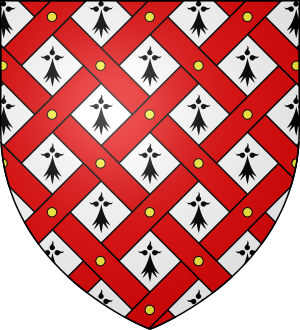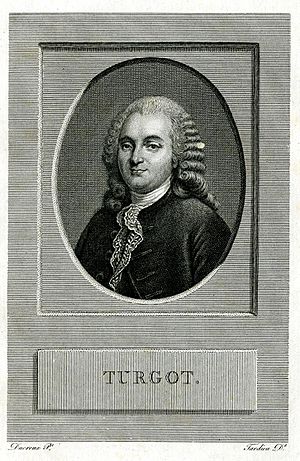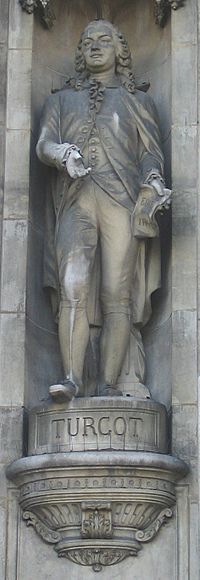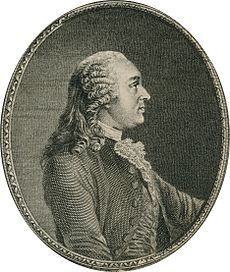Anne Robert Jacques Turgot facts for kids
Quick facts for kids
Anne Robert Jacques Turgot
|
|
|---|---|
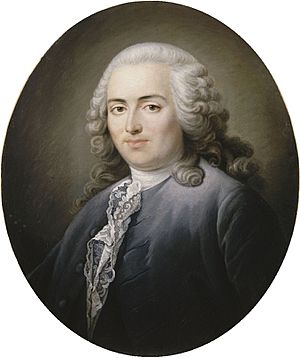
Portrait of Turgot by Antoine Graincourt, now in Versailles
|
|
| First Minister of State | |
| In office 24 August 1774 – 12 May 1776 |
|
| Monarch | Louis XVI |
| Preceded by | René Nicolas de Maupeou |
| Succeeded by | The Count of Maurepas |
| Controller-General of Finances | |
| In office 24 August 1774 – 12 May 1776 |
|
| Monarch | Louis XVI |
| Preceded by | Joseph Marie Terray |
| Succeeded by | Baron de Nuits |
| Secretaries of State for the Navy | |
| In office 20 July 1774 – 24 August 1774 |
|
| Monarch | Louis XVI |
| Preceded by | Marquis de Boynes |
| Succeeded by | Antoine de Sartine |
| Personal details | |
| Born | 10 May 1727 Paris, France |
| Died | 18 March 1781 (aged 53) Paris, France |
| influenced | Condorcet · Maistre · Rothbard · Schumpeter · Smith · Marx · Keynes |
| Signature | |
| Academic career | |
| Field | Political economics |
| School or tradition |
Physiocrats |
| Alma mater | Sorbonne |
| Influences | Montesquieu · Quesnay |
Anne Robert Jacques Turgot, Baron de l'Aulne (born May 10, 1727 – died March 18, 1781), often known simply as Turgot, was an important French economist and government official. He is remembered today as an early supporter of economic liberalism, which means he believed in less government control over the economy. He was also one of the first to understand the idea of "diminishing returns" in farming, which means that adding more and more of one thing (like fertilizer) to land will eventually lead to smaller increases in crops.
Contents
- What was Turgot's early life and education like?
- What were Turgot's ideas about progress?
- How did Turgot start his career in government?
- What did Turgot do as Intendant of Limoges?
- What was Turgot's famous work, Réflexions?
- What did Turgot do as a minister for King Louis XVI?
- Why did Turgot fall from power?
- Images for kids
- See also
What was Turgot's early life and education like?
Turgot was born in Paris, France. His father, Michel-Étienne Turgot, was a respected merchant leader in Paris. Turgot came from an old family from Normandy. He was the youngest of four children.
He first studied to become a priest at the Sorbonne university, starting in 1749. While there, he wrote two impressive papers in Latin. One was about the good things Christianity brought to people, and the other was about how human thinking has improved over time. However, in 1750, he decided not to become a priest. He said he "could not bear to wear a mask all his life," meaning he didn't want to pretend to be something he wasn't.
Turgot became interested in economics early on. In 1749, he wrote a letter about paper money, disagreeing with another student who supported a controversial financial system. He also enjoyed writing poetry.
What were Turgot's ideas about progress?
Turgot was one of the first to fully explain the "Idea of Progress." In his 1750 paper, "A Philosophical Review of the Successive Advances of the Human Mind," he argued that progress isn't just about science and art. He believed it also includes how society develops, like manners, customs, laws, the economy, and how people live together.
How did Turgot start his career in government?
In 1752, Turgot began his career in the French legal system. He became a "substitut" and then a "conseiller" in the parlement of Paris, which was a high court. In 1753, he became a "maître des requêtes," a senior legal official.
In Paris, he often visited popular social gatherings called salons. Here, he met important thinkers and economists, including the leaders of the "physiocratic" school. Physiocrats believed that a nation's wealth came only from land and agriculture. They also believed in "laisser faire, laisser passer," which means "let do, let pass." This idea promoted free trade and less government interference in the economy.
From 1753 to 1760, Turgot wrote many articles and essays. He supported religious tolerance and free trade. He also wrote for the famous Encyclopédie, a major work of the Age of Enlightenment.
What did Turgot do as Intendant of Limoges?
In August 1761, Turgot was appointed "intendant" (a royal administrator or tax collector) for the region of Limoges. This area was one of the poorest and most heavily taxed parts of France. He stayed there for thirteen years and tried to apply his economic ideas.
- Fairer Taxes: He worked to create a new land survey (cadastre) to make taxes fairer. He also managed to reduce the amount of tax the province had to pay. He suggested a "distributive tax," where the tax burden was shared more evenly.
- Roads and Labor: He replaced the corvée (forced labor on roads) with a money tax paid by the whole province. This allowed roads to be built by contractors, making the process more efficient and fairer.
- Economic Ideas: He wrote about lending money at interest, arguing for a scientific approach rather than just a religious one. He also spoke out against government control in industries like mining and iron production, supporting free competition.
- Helping the Poor: During a famine in 1770–1771, he made landowners responsible for helping the poor people who worked for them. He also set up workshops and charity offices to provide work and relief. He believed in helping those who truly needed it, but not giving out charity without thought.
- Free Grain Trade: He wrote famous letters arguing for free trade in grain. He believed that removing all restrictions on grain trade would benefit everyone, from farmers to consumers.
What was Turgot's famous work, Réflexions?
Turgot's most well-known work is Reflections on the Formation and Distribution of Wealth. He wrote it in 1766. In this book, Turgot explained that land is the main source of wealth. He divided society into three groups: farmers (who produce wealth), artisans (who are paid for their skills), and landowners. He also discussed how capital works and argued that only the net product from land should be taxed. He strongly called for complete freedom in business and industry.
What did Turgot do as a minister for King Louis XVI?
In July 1774, Turgot was called to serve in the government of the new king, Louis XVI. He was first appointed as the minister of the navy. A month later, he became the Controller-General of Finances, which was a very important position in charge of the country's money.
How did Turgot try to fix France's money problems?
Turgot's main goal was to fix France's terrible financial situation. He told the king his guiding rules: "No bankruptcy, no increase of taxation, no borrowing." He wanted to save money in every part of the government.
- Cutting Spending: He made sure all government spending was approved by him. He got rid of many unnecessary jobs and stopped the misuse of royal spending accounts. He even asked the king to stop giving out so many favors and pensions.
- Tax Reforms: He planned to reform the tax collection system. He also improved the royal mail service, making it faster and more comfortable.
- Budgeting: Turgot created a regular budget. His efforts greatly reduced the government's debt and improved France's credit. He even managed to get a loan from Dutch bankers at a low interest rate. However, the debt was still very large.
- American Revolution: He was against France getting involved in the American Revolutionary War. He believed France could not afford it financially.
What did Turgot do about free trade?
Turgot immediately worked to establish free trade in grain. He issued an edict (a royal order) in September 1774. This edict faced strong opposition, even from within the king's own council. Many people who had benefited from controlling the grain trade under the previous system hated Turgot's changes.
A poor harvest in 1774 caused bread prices to rise sharply in 1774–1775. This led to serious bread riots, known as the guerre des farines (flour war). Turgot acted firmly to stop the riots. He was careful not to use too many soldiers, believing that too much force could make things worse. He also disagreed with the king, who wanted to promise lower bread prices to the crowds. Turgot insisted that prices should remain high to encourage supply.
How did Turgot challenge old privileges?
Turgot prepared six important edicts, which he presented to the king's council in January 1776. Two of these caused a lot of anger:
- Ending Forced Labor: One edict ended the corvées, which were forced labor duties on peasants for road building. Turgot boldly stated that his goal was to end special privileges and make everyone, including nobles and clergy, pay taxes.
- Ending Guild Privileges: The other edict ended the jurandes and maîtrises, which were rules that protected the privileges of craft guilds. Turgot believed that everyone should have the right to work without restrictions.
These changes made many powerful groups angry. Nobles, high courts, the royal court, and wealthy merchants all opposed him. Even the queen disliked him because he refused to grant favors to her friends.
What were Turgot's ideas for a new government?
Turgot believed in an "enlightened absolutism," meaning he thought the king should have absolute power but use it wisely to make reforms. He thought the high courts should not interfere with lawmaking.
He proposed a new system in his Mémoire sur les municipalités. In this plan, only landowners would vote, regardless of their social class. Local councils would elect representatives to district councils, then to provincial councils, and finally to a "grande municipalité." This main council would not make laws but would manage taxes, education, and help for the poor. King Louis XVI found this plan too radical and risky.
Why did Turgot fall from power?
It's not entirely clear why Turgot lost his position. Some say there was a plot against him, with false letters shown to the king. Others believe the queen played a key role because she disliked him for opposing favors for her friends. The king's chief advisor, Maurepas, also turned against Turgot, possibly out of jealousy.
When Turgot's friend Malesherbes resigned in April 1776, Turgot wanted to replace him with someone he trusted. However, Maurepas suggested someone else. Turgot wrote an angry letter to the king, criticizing him for not listening and warning about the dangers of a weak government. This letter was shown to Maurepas, making him even more determined to get rid of Turgot.
With so many powerful enemies, Turgot's removal was certain. He wanted to stay long enough to finish his plan for reforming the royal household, but he was not allowed. On May 12, 1776, he was ordered to resign. He then retired from public life and spent his remaining years studying science and literature.
Images for kids
See also
 In Spanish: Anne Robert Jacques Turgot para niños
In Spanish: Anne Robert Jacques Turgot para niños
 | William Lucy |
 | Charles Hayes |
 | Cleveland Robinson |


